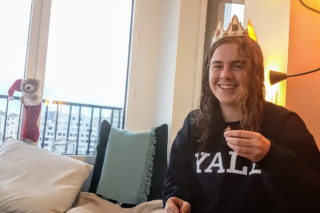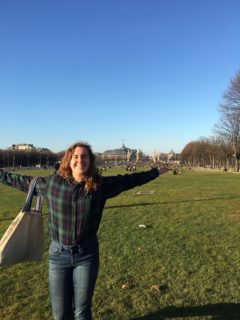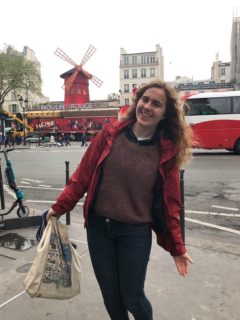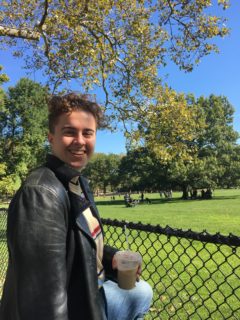Studying Abroad as a Neuroscience Major

Kathryn Paton reflects on how her time in Paris helped her grow as a scientist and researcher.
Neuroscience Major, Yale University
CUPA Spring 2019
My friends and older students told me that because I was a STEM student, I couldn’t study abroad. I’m glad I didn’t listen to them – my time with CUPA in Paris ended up boosting my scientific education in profoundly surprising ways.
I am a neuroscience major, and I spent seven months in Paris in the spring and summer of 2019. During that time, I took a course in neuropsychology and worked with two Parisian universities, interning at the Paris Descartes Babylab in the spring and working full-time as a research assistant at ENS for the summer. Most importantly, I joined the CUPA family, which gave me vital support at every step of the way.
Before I arrived in Paris – from my first emails inquiring about “la chimie a l’étranger” to the Nanterre and Paris 8 psychology offerings Cécile personally sent me – CUPA staff responded to my overblown anxieties with patience and helpfulness. I still didn’t fully appreciate the value of CUPA’s unique facilitated direct enrollment program until I arrived in Paris and saw how bureaucratic normal French students found enrollment, and how shocking our free choice of courses – across departments, degree years, and even universities – was to my peer students and professors.
After all this planning (and trying out far more classes than I could possibly continue with!) I expected the neuropsychology course I chose to be a simple highlight. CUPA told us time and time again, but it still took my firsthand experience to understand: I had to work more independently than at home to achieve success and enrichment in the French academic system. This particular lecture frustrated me by seeming disorganized and slow-progressing. I talked to the professor about her research and made some progress on the individual reading I specified, with CUPA’s guidance, in my “projet de travail”*. However, this class ultimately most influenced me by pushing me to make time for more ambitious intellectual experiences outside of the classroom.
I interned at Paris Descartes because of a reference: that fall, a Yale mentor had encouraged me to contact a specific professor, and we exchanged emails. After settling into my classes, I visited her lab and started helping out with a few studies involving sleep, attention, and language acquisition in infants. When CUPA staff insisted on the necessity of an official “convention de stage” and drew up the document – with precise commitment hours and dates – I was skeptical; weren’t flexible hours and a good relationship with my boss sufficient? I later realized the wisdom of what to me, an American student, had seemed like unnecessary bureaucracy: the agreement helped me protect my rights and personal time as an unpaid intern. In France, perhaps for the first time, I learned to prioritize my life as well as my work and was happier and more productive as a result.
What did I learn from all of this? My opportunities seemed glamorous but ultimately involved a lot of menial grunt work — scientific production demands a lot of that from people low on the totem pole! I definitely didn’t expect how much time I’d spend staring at dim videos, switching between individual frames to determine when exactly a baby closed its eyes. But the experience benefited me and continues to do so. In May, my boss offered to circulate my resume, which helped me find a job at another research university. In more subtle ways – through details like chatting with postdocs, attending meetings, and reading what PhD postings, conference applications, and lecture notices are shared on the email list – joining this community, even if my own work often seemed trivial, has helped me break open the “black box” academic research used to be to me and imagine concretely what my future could be like.
My summer work at l’École Normale Supérieure (ENS) helped me even more in this regard, but it – even recruitment – was further out of my comfort zone. When I timidly asked to print my employment paperwork at CUPA despite my expired student status, CUPA staff enthusiastically responded that I would always be at home at CUPA, checked in on my summer lodging search, and offered to glance at my recruitment paperwork – I felt completely overwhelmed by the mess of forms and documents that was necessary to make me a temporary French civil servant. After, when I felt stressed by my significant independence and flexible, often self-determined responsibilities, spending time with my CUPA community recentered me.
And I often felt overwhelmed, productively so. I love my neuroscience major, but working on tasks like study design at ENS helped me realize holes in my undergraduate education – particularly, I need a more rigorous statistical foundation to be an effective and intentional researcher. In addition to giving me valuable professional experience, insight, and mentors, my summer work in Paris changed my thinking about my future and influenced which graduate programs I am considering.
I still don’t know what exactly my scientific future holds, but after my experience in Paris with CUPA, I feel much more confident in my ability to live and flourish in that uncertainty. None of my academic or professional experiences were quite, or even vaguely near to, what I expected: I had arrived in Paris anxious to find a neuroscience course to count towards my major, research still seemed like a “black box,” and I hardly expected my professor’s reference would come to anything. I had a few solid ideas – I took the initiative to use resources at my home university to locate professional networks in Paris, and I sought out opportunities to see my discipline from a different cultural perspective. However, there was so much I didn’t know and didn’t know I didn’t know. While I was pushed to learn and live independently, CUPA was there with me every step of the way. Ultimately, CUPA gave me the technical advice, academic flexibility and independence, and supportive family I didn’t know I needed to turn my “elective” sophomore spring abroad into a singularly formative experience in my scientific education.
* CUPA requires all French immersion students to create a projet de travail for each of their direct matriculation courses. The goal of this assignment is to help students plan and structure their work throughout the semester. The French university system expects a higher level of logistical and administrative independence from its students as compared to American universities. For example, a professor at an American university might assign specific readings every week, while a French professor will provide an extensive bibliography of reference from which students are expected to use their judgement to choose their own readings. The projet de travail has proven itself to be extremely helpful to CUPA students, ultimately playing an important role in their success within the French university system.


